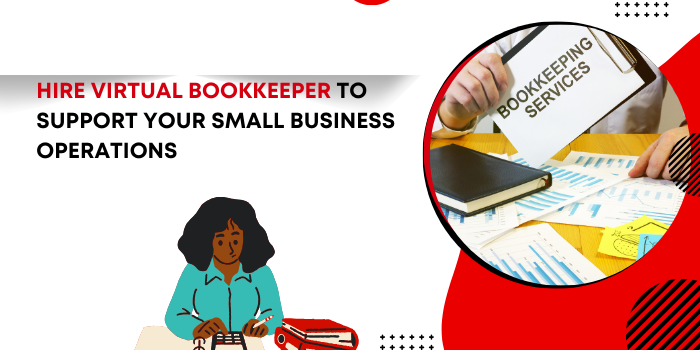 Business
Business
Hire Virtual Bookkeeper to Support Your Small Business Operations
Managing finances can quickly become one of the most overwhelming parts of running a small business. Between invoicing clients, tracking expenses, handling payroll, and staying compliant with tax regulations, many business owners find themselves drowning in numbers instead of focusing on growth. That’s where the option to hire a virtual bookkeeper can become a game-changer.
A virtual bookkeeper provides the same level of support as an in-house financial assistant, but without the added expense of office space, benefits, or a full-time salary. Whether you’re running a solo consultancy or a small team-based startup, this modern approach to bookkeeping offers flexibility, cost-efficiency, and professional expertise—all accessible remotely.
Let’s explore why hiring a virtual bookkeeper could be the smartest operational move for your small business.
Reduced Overhead and Operational Costs
Hiring an in-house bookkeeper means absorbing a range of fixed expenses—monthly salaries, benefits, office supplies, and even software licenses. For small businesses operating on tight budgets, these costs can be difficult to sustain. A virtual bookkeeper works remotely and usually offers services based on flexible pricing models such as hourly billing, retainer agreements, or package deals.
Financial Benefits Include:
-
No employee benefit costs or taxes
-
Reduced need for physical office space or equipment
-
Access to professional tools and software without separate subscription fees
-
Pay only for the hours or tasks you need
This lean approach helps conserve resources and directs your capital toward growth-oriented initiatives.
Access to Specialized Skills and Technology
Virtual bookkeeping professionals typically come equipped with advanced knowledge in financial tools and platforms like QuickBooks, Xero, FreshBooks, and Wave. This allows small businesses to access enterprise-level technology and skill sets without the associated costs of hiring a full-fledged accounting team.
Many virtual bookkeepers are trained to:
-
Handle accrual and cash-based accounting
-
Generate financial reports tailored for your business model
-
Reconcile bank accounts and credit card transactions
-
Support tax filing preparation in collaboration with your CPA
-
Maintain compliance with local and federal tax laws
By hiring someone with up-to-date knowledge of financial technology and best practices, your business benefits from better accuracy and efficiency in financial management.
More Time to Focus on Core Operations
Delegating bookkeeping responsibilities frees up substantial time—time that can be reinvested in serving clients, improving products, or building strategic partnerships. Many business owners underestimate how much time is lost trying to manually manage accounts.
When you hire a virtual bookkeeper, you’re essentially gaining a partner who manages:
-
Day-to-day transaction recording
-
Accounts receivable and accounts payable tracking
-
Monthly reconciliation
-
Financial reporting and forecasting support
Not only do you save hours every week, but you also get peace of mind knowing that someone is keeping a close eye on your numbers. This clarity allows you to make faster, smarter business decisions.
Scalability and Flexibility as You Grow
As your business expands, so do your financial complexities. What starts as a few simple spreadsheets can quickly morph into a maze of client invoices, vendor payments, multi-currency transactions, and payroll processes. A virtual bookkeeper provides a scalable solution, adapting services to fit your business’s changing needs.
Advantages of scalability include:
-
Easily increase or reduce hours of support based on workload
-
Add services such as cash flow forecasting or budgeting as needed
-
Manage seasonal fluctuations in financial activity without hiring or firing
Since virtual bookkeepers often work with multiple clients, they’re skilled at transitioning between different stages of business growth, ensuring your financial systems evolve in tandem with your operations.
Enhanced Accuracy and Compliance
One of the main concerns with DIY bookkeeping is the risk of errors—missed entries, incorrect categorizations, or non-compliance with tax laws. Even small mistakes can lead to IRS penalties or strained relationships with vendors and customers. A professional virtual bookkeeper minimizes these risks.
They are trained to follow best accounting practices and stay updated on tax laws and regulatory changes that may impact your business. By maintaining clean and up-to-date records, they ensure that you’re always ready for audits, tax filing, or investor scrutiny.
Improved Cash Flow Management
Understanding cash flow is crucial for any small business. Without it, even profitable companies can experience sudden financial strain. A virtual bookkeeper doesn’t just record transactions—they can also provide insights into spending patterns, overdue payments, and shortfalls.
Common ways a virtual bookkeeper supports cash flow:
-
Monitoring incoming and outgoing payments
-
Sending timely invoices and payment reminders
-
Flagging discrepancies or unpaid accounts
-
Offering suggestions to manage expenses more efficiently
With real-time visibility into your financial standing, you’re better prepared to make informed decisions and avoid cash crunches.
Confidentiality and Data Security
Business owners are often concerned about sharing sensitive financial data with remote professionals. However, reputable virtual bookkeepers implement secure systems for managing client information.
-
Many use encrypted cloud storage systems
-
Access to records is limited through permissions
-
Contracts include non-disclosure agreements (NDAs)
-
Regular backups ensure data safety and recovery
Working with certified or credentialed bookkeepers adds an additional layer of trust and accountability.
Choosing the Right Virtual Bookkeeper for Your Business
Finding the right fit means going beyond a resume. You need someone who understands your industry, is familiar with your software stack, and communicates clearly.
What to look for:
-
Certifications such as CPA, CMA, or QuickBooks ProAdvisor
-
Industry experience (e.g., ecommerce, real estate, consulting)
-
Clear communication style and availability
-
Positive client testimonials or references
-
Transparent pricing and scope of work
Start with a small test project or limited hours to evaluate compatibility before scaling up.
Final Thoughts
Deciding to hire a virtual bookkeeper can be one of the most empowering steps a small business owner takes. It not only simplifies operations and reduces stress, but also provides access to professional insights that can help shape your financial future. Rather than struggling through spreadsheets and deadlines, you can focus your energy where it matters most—building a resilient and profitable business.
When chosen wisely, a virtual bookkeeper becomes more than just a number cruncher—they become a vital part of your business team.
Click here to read more article- simplychiclife.com









